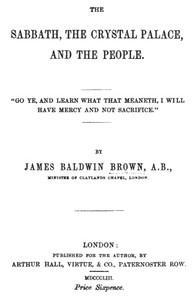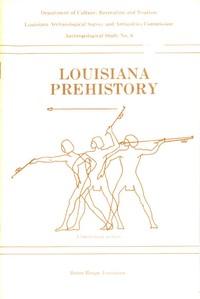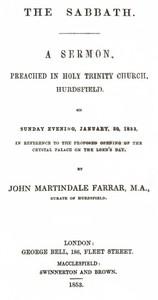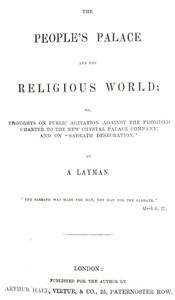Read this ebook for free! No credit card needed, absolutely nothing to pay.
Words: 14212 in 3 pages
This is an ebook sharing website. You can read the uploaded ebooks for free here. No credit cards needed, nothing to pay. If you want to own a digital copy of the ebook, or want to read offline with your favorite ebook-reader, then you can choose to buy and download the ebook.


: The Sabbath the Crystal Palace and the People by Brown James Baldwin - Sunday; Crystal Palace (Sydenham London England); Sunday legislation
THE SABBATH, THE CRYSTAL PALACE, AND THE PEOPLE.
"GO YE, AND LEARN WHAT THAT MEANETH, I WILL HAVE MERCY AND NOT SACRIFICE."
BY JAMES BALDWIN BROWN, A.B., MINISTER OF CLAYLANDS CHAPEL, LONDON.
THE SABBATH, THE CRYSTAL PALACE, AND THE PEOPLE.
THE relation between the Church of Christ and human society has long been ill-defined and unsettled. The Church has to present to society, in its struggles and sufferings, an aspect in which the kindliness of human sympathy and interest is blent with the severity of truth; and this is always difficult. Between worldly compliances on the one hand, and bigoted formalities on the other, it is hard to strike the mean. Between the two extremes the Church is prone to alternate. This question,--"The opening of the Crystal Palace during a portion of the Lord's Day," demands the statement of the feeling and thought of the Church upon this subject at the present time. The spirit of a party is quite as significant as its acts and expressions, for that spirit is a living fountain, out of which other acts and feelings will flow forth; and as the utterance of the mind of the Church upon this great question will probably determine the character of its relation to, and influence on society for some years to come, we should watch most carefully, not over our words and deeds only, but over the spirit in which we address ourselves to this discussion. We must be prepared either to reform or re-affirm our first principles, as to the relation between the Church and the human world--for this is, emphatically, a question of first principles; it has been dealt with too much in detail; we must look to the foundations if we would settle it aright. Nor is it a matter of merely casual and momentary importance to which party we attach ourselves, and what cry we raise. The party will do more work on us personally than we shall do for the party. It is possible that we may be taking for ourselves and for the Church many backward steps, by joining ourselves unthinkingly to those who, whether right or wrong, certainly are most loud and dogmatic in their tone. It is possible, that by calmly taking our stand on a principle which has but few supporters, we may find ourselves, though we appear to stand alone on earth, in holy fellowship with the clear-eyed watchers of all earth's transactions, who bend over heaven's blue cope to regard us, and with the God of truth and love. Therefore let us watch and pray while we thoughtfully consider this question, for it is a solemn matter, and affects the weal of the Church and the world, and our own with them, far more deeply than at first appears.
The question to be considered in the following pages is this:--"Is it wise and right for us, as Christians, to offer any opposition to the opening of the Crystal Palace during a portion of the Lord's day?" I trust that all into whose hands this may come, are of one mind as to the value and importance of the Sabbath. But there are those who take the negative on this question, who are as loyal to the Sabbath, as honestly desirous to have it better and more extensively observed, as the straitest of those who have set themselves forth as its special defenders. In making this clear, it will be needful to examine the views of the great parties who have expressed themselves against interference in this matter, but on grounds with which I cannot accord.
There are many who take no part in the protest of, at any rate, a large portion of the religious public, simply on the ground that an appeal to Government, on any subject involving religious principles and considerations, is undesirable in itself, and dangerous, inasmuch as it may be made the precedent for future interference, in some more serious form. Gallio is their model ruler, a man "who cared for none of these things." They hold that the State should have no thought and no voice on such matters. That such a movement as that of the Crystal Palace Company may safely be left to stand or fall by its own merits. If it be good, they are sure it will come to something; if bad, they have a happy faith that it will come to nought. No doubt, such theories have a strong intrenchment in the order of a ruling Providence. Somehow, good things do live, bad things do die, notwithstanding man's efforts to the contrary; but still, bad things are long a-dying, and God expects us all--rulers, too, according to the measure of their rule--to help to end them, and get them decently buried out of sight. Had there been a petition to Government to open all the beer-shops in the kingdom all day and all night on the Sabbath, and the Government said yea, should we dare to sit calmly by, and trust that the evil would cure itself? Is it not the business of Government to help to protect, by governmental effort and action, the whole community from the effects of the worst passions and most degrading views of the community? Though, no doubt, the highest condition of a State is that in which a healthy, moral, public feeling renders such interference needless. We have hardly yet arrived at this Utopia of politics, and this excessive jealousy of Government, in the present condition of England, obstructs many useful measures. The objection to Government expressing itself on this subject seems to be a radically unsound one. The question must be discussed on quite other principles, if a healthy settlement of it is to be made.
There is a second party, which refuses to join in the protest through indifference to the Sabbath, or latitudinarian views of its nature and claims. To them, the Sabbath appears to be simply a human institution; a thing invented by priests for priestly purposes; an enslavement of man's free spirit; a formalism which mars the pure essence of devotion, makes it a thing of times and seasons, and desecrates every other day that it may consecrate one. "Every day is a Sabbath," according to this doctrine; to attach holiness to any particular day, is to rob all the rest of the holiness which belongs to them. To tell a man that he can worship best in sanctuaries in Sabbath seasons, is to fetter his right and liberty of worship at all times and places; and, in short, the Sabbath is regarded as the very key-stone of that arch of formalism on which the Church rears the superstructure of her power. Such is the latitudinarian view of the Sabbath; and, of course, those who hold it, rejoice in the prospect of the opening of the Crystal Palace on that day. In order to discern the falseness of their views, we must glance at the true idea of the Christian Sabbath.
Of all the popular cants of the day, perhaps that is at once the most pretentious, and the most heartless, which asserts a necessary antagonism between form and spirit, soul and body, the spiritual and the material, and sets itself up as the special champion of spirit and the spiritual, by maintaining that all forms and organizations, all times and seasons, all modes and habitudes, are systematic conspiracies against the liberties and rights of men. This is the latest resurrection of the old ascetic spirit, and must end--as all attempts to emancipate ourselves from the conditions of life and development which God has implied in the constitution of our being and of all things--have ended, in blank immorality and shameless denial of all moral law. This is the great danger of our times. It is not formalism that we have chiefly to fear. There is more peril of our casting off all form and order, than of our being mastered and bound by any one. The Sabbath is of God. He who causeth the outgoing of the morning and evening to rejoice, causeth the outgoing of the Sabbath morning to rejoice over the human world. He who gives to the weary body the refreshment of nightly slumber, gives to the weary mind and spirit the rest of the Sabbath day. We may steal the hours from slumber, but the wrong will in the end avenge itself; and it is at our peril, and to our certain detriment as men, societies, or nations, that we steal its offices from the Sabbath. The moon, the fairest and the benignest minister that attends our earth, marks out our weeks for us. She chimes with notes of silvery clearness the sevens, while the sun intones the units on the bells of time. In full tune with living nature we keep our Sabbaths. We enter into the universal harmony when we consecrate our seventh day. This surface analogy rests on the deepest principles; and if, to any, this orderly procession of the Sabbaths seem a formalism, a yoke of bondage, then the day, the night, the periodic mealtime, the Christmas festival, the birthday greeting, must be to them a torment and an insult. The arrangements of all things must be, to such, a maddening discord. Even the primitive simplicities of barbaric existence, if they could recur to it, would not emancipate them. But such an experience might, perhaps, convince them, that these consecrations are the records of a vital progress--that these seasons, cut off from the lump of untrained, untrimmed, unformed existence, are the string courses of the masonry of that living temple of society, which mark the lines of its emergence from the dark ocean of primitive barbaric chaos and night.
Thus far we have hardly glanced at the Sabbath as a positive institution of the Lawgiver and Ruler of this world. The view of the Sabbath which has already been presented, seems to underlie all Divine legislation upon the subject. This is the foundation on which it rests, towards the realization of this it works. We miss much of the meaning of the old Jewish legislation, by not going deep down beneath the positive commandment, and studying, as we are able--nay, if friends of Christ, bound to do--the necessity out of which the law arises, the feature of the original Divine constitution which it is intended to illustrate and guard. This method will bring us into true tune with the commandment, our observance will then be spiritual, that of a friend, a child, not a slave. Every law must have its reason in the nature of things, must be intended to direct attention to, vindicate, or restore, some reality which is in danger of being disregarded. It is needful to see what is behind the law, in order to understand it truly. God saw that there was in man a fearful tendency to deny the God that made him, by withholding himself from the higher exercises, the higher life, of which God made him capable--getting rid of spiritual burden and care, and making his life as much like a brute's as it could possibly become. He saw, moreover, that the struggle between the higher element and the lower, the spirit and the flesh, which had broken loose from the spirit's control, would be a long and sharp one, in each human soul, and in the world at large; and, tenderly compassionating his afflicted and distracted prodigal children, He came, even in the very hour of their apostacy, to help the higher nature in its conflicts, and finally give to it the victory by allying it for ever with himself. His purpose of mercy had a methodic development--first the germ, then the blade, then the ear, and after that the full corn in the ear. He chose Abraham as the man through whom He would enter into relations with his descendants, the Jewish people, constituting them the people through whom He would enter into relations with the whole human world. He gave to the Jews a law, the purpose of which was to bring out the original features of the constitution of man, and his primal relations to God and to all things. That which had been lost in the fall was re-established by the Jewish economy, and every ordinance of God, which man, the sinner, had trampled upon and spurned, was brought forth again, and sealed afresh, in the sight of all the people, and, through history, in the sight of all men, with the seal of the Almighty and the All-wise. The Jews, in this solemn covenant, were the representative people, through whom God was addressing the whole human race. It was, above all things needful, to bring out the idea that there was power to support the original constitution of things, though man had been suffered to attempt, for a time, at any rate, to violate it. God needed to bear most solemn witness before men, that no violation of it could be successful; that it was girded with the living splendour of His righteousness, and sustained by the terrible resources of His power. This, man had forgotten. "Am I my brother's keeper?" said one, in wanton contempt of the law of that relationship of brotherhood which had been established by God. "These be thy gods," said others, as they danced around their golden calf, and, under the very shadow of Sinai, made light of the living Lord. Men were growing wanton in the unbounded license to sin, to break every Divine command without immediate and palpable penalty. God had to tell this people, and through them the world, with a terrible simplicity and sternness which even they could understand, that an awful sanction attended the original unwritten laws which He had established, and that the penalty of a systematic breach of them must be death. Let us take the legislation on the Sabbath as a specimen.
Having laid down these principles with regard to the Christian Sabbath, in refutation of the rationalistic argument, let us proceed to the practical application of them to the matter in hand. The case is just this. An institution is about to be formed and an exhibition opened, which must be regarded as the legitimate fruit of the forty years' peace which that stern warrior conquered for us, whom we have just attended with befitting splendour to his burial, whose mourners were a million and a half of men. The Crystal Palace of last year was its direct result--the World's Great Show--the Jubilee of Commerce, celebrated with festal pomp in London--the heart of the body commercial--whence also had gone forth, forty years ago, the head and the hands which had torn the troubler of the world's peace from his throne, and inaugurated the new era. England gained the victory, and at the end of a long generation, unparalleled for activity and enterprise in the history of man, she called the world to her capital to see and to taste the fruits. Her grey old warrior was spared to see it. The peaceful pageant of commerce passed by him and did him homage, and then he was taken to his rest. It is surely remarkable, that Wellington was spared to see the crown of his labours--the fruit of generations of peaceful activities, which will be marked in history by his name--and then was removed before the event was consummated which may cost the world another struggle, and the blood of her bravest men. Such was the Crystal Palace of 1851.
Free books android app tbrJar TBR JAR Read Free books online gutenberg
More posts by @FreeBooks


: Louisiana Prehistory by Hawkins Nancy W Neuman Robert W - Indians of North America Louisiana Antiquities; Louisiana Antiquities


: The Sabbath a sermon preached in Holy Trinity Church Hurdsfield on Sunday Evening January 30 1853 in reference to the proposed opening of the Crystal Palace on the Lord's day by Farrar John Martindale - Sunday; Church of England Sermons 19th century; Crys





